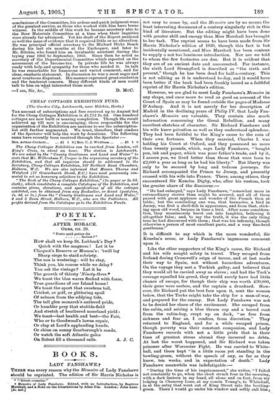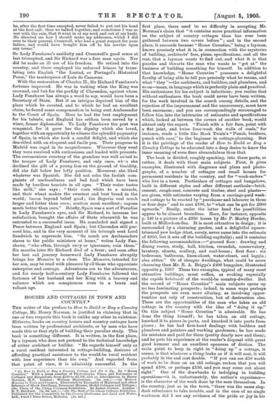LADY FANSHAWE.t • " Bibali consulie. •
Meutoire of Lady .Fanshawe. Edited, with an Introduction, by Beatrice Marshall, and a Note on the Illustrations; by Allan yea. London John Lane. L5e. het.)
kind of literature. But the editing might have been done with greater skill and energy than Miss Marshall has brought to her task. The reprint seems to have been made from Sir Harris Nicholas's • edition of 1830, though this fact is but incidentally mentioned, and Miss Marshall has been content to supply a not too luminous introduction. Nor are we told to whom the -few footnotes are due. But it is evident that they are of an ancient date and uncorrected. For instance, the sixth Lord Strangford is described as "the sixth and present," though he has been dead for half-a-century. This is not editing as it is understood to-day, and it would have been better if the book had been frankly issued as a faithful reprint of Sir Harris Nicholas's edition.
However, we are glad to meet Lady Fanshawe's Memoirs in any shape, and once more to read as good an account of the Court of Spain as may be found outside the pages of Madame D'Aulnoy. And it is not merely for her description of Madrid in the declining years of Philip IV. that Lady Fan- shawe's Memoirs are valuable. They contain also much information concerning the Great Rebellion, and many excellent sketches of character. Sir Richard Fanshawe and his wife knew privation as well as they understood splendour. They had been faithful to the King's cause to the ruin of their own fortunes. When they married, Charles I. was holding his Court at Oxford, and they possessed no more than twenty pounds, which, says Lady Fanshawe, "bought pen, ink and paper, which was your father's trade, and by it, I assure you, we lived better than those that were born to
£2,000 a year as long as he had his liberty." But liberty was only to be secured by long and tedious journeys. Sir Richard accompanied the Prince to Jersey, and presently crossed with his wife into France. There, among others, they encountered Sir Kenelm Digby, who, after his custom, took the greater share of the discourse:— "He had enlarged," says Lady Fanshawe, "somewhat more in extraordinary stories than might be averred, and all of them passed with great applause and wonder of the French then at table ; but the concluding one was, that barnacles, a bird in Jersey, was first a shell-fish in appearance, and from that, stick- ing upon old wood, became in time a bird. After some considera- tion, they unanimously burst out into laughter, believing it altogether false ; and, to say the truth, it was the only thing true he had discoursed with them; that was his infirmity, though otherwise a person of most excellent parts, and a very fine-bred gentleman.'
It is difficult to say which is the more wonderful, Sir
Kenelm's error, or Lady Fanshawe's ingenuous comment upon it.
Like the other supporters of the King's cause, Sir Richard and his wife sought safety in travel. They escaped from Ireland during Cromwell's reign of terror, and at last made their way to Spain, not without hazardous adventures. On the voyage they met a Turkish galley, and believed that they would all be carried away as slaves ; and had the Turk's courage equalled his greed, they would surely have had little chance of escape, for though their ship was worth 230,000, their guns were useless, and the captain a drunkard. How- ever, Sir Richard put the best face upon it, sent the women below, that the Turks might take the ship• for a man-of-war, and prepared for the enemy. But Lady Fanshawe was not to be denied her share of the excitement. She escaped from the cabin, and seizing a blue thrum cap and a tarred coat from the cabin-boy, crept up on deck, "as free from sickness and fear as, I confess, from discretion." They returned to England, and for a while escaped prison, though poverty was their constant companion, and Lady Fanshawe records with not a little pride that in their time of greatest stress abroad they incurred no debts. At last the worst happened, and Sir Richard was taken prisoner after Worcester Fight. He was carried to White-
hall, and there kept "in a little room yet standing in the bowling-green, without the speech of any, as far as they
knew, ten weeks, and in expectation of death." Lady Fanshawe meanwhile was indefatigable
"During the time of his imprisonment," she writes," I failed not constantly to go, when the clock struck four in the morning, with a dark lantern in my hand, all alone and on foot, from my lodging in Chancery Lane, at my cousin Young's, to Whitehall, in at the entry that went out of Xing Street into the bowling.. green. There I would go under his window and softly call him;
he, after the first time excepted, never failed to put out his head at the first call: thus we talked together, and sometimes I was so wet with the rain, that it went in at my neck and out at my heels. He directed me how I should make my addresses, which I did ever to their general, Cromwell, who had a great respect for your father, and would have bought him off to his service upon any terms."
So Lady Fansbawe's assiduity and Cromwell's good sense at last triumphed, and Sir Richard was a free man again. Nor did he make an ill use of his freedom. He retired into the country, and there employed his enforced leisure by trans- lating into English "the Luciad, or Portugal's Historical Poem," the masterpiece of Luis de Camoens.
With the restoration of Charles II., Sir Richard Fanshawe's fortunes improved. He was in waiting when the King was crowned, and but for the perfidy of Clarendon, against whom Lady Fanshawe has always a word to say, would have been a Secretary of State. But if an intrigue deprived him of the place which he coveted, and to which he had an excellent claim, be found some compensation in being sent Ambassador to the Court of Spain. Here he had the best employment for his talents, and England has seldom been served by a wiser, firmer diplomatist. To Lady Fanshawe the post was congenial, for it gave her the dignity which she loved, together with an opportunity to witness the splendid pageantry of Spain, in which she took a candid delight, and which she described with an eloquent and facile pen. Their progress to Madrid was regal in its magnificence. Wherever they went they were received with enthusiasm and loaded with presents. The ceremonious courtesy of the grandees was well suited to the temper of Lady Fanshawe, and only once, whnn she declined the gift of a young lion on the ground of timidity, did she fall below her lofty position. Moreover, she liked whatever was Spanish. She did not echo the foolish com- plaints of uncleanliness and bad food which have been made by heedless tourists in all ages. "Their water tastes like milk," she says ; "their corn white to a miracle, and their wheat makes the sweetest and best bread in the world ; bacon beyond belief good ; the Segovia veal much larger and fatter than ours; mutton most excellent ; capons much better than ours." Briefly, Spain was a sort of Paradise in Lady Fanshawe's eyes, and Sir Richard, to increase her satisfaction, brought the affairs of State wherewith he was entrusted to a successful issue. He concluded and signed a Peace between England and Spain; but Clarendon still pur- sued him, and in the very moment of his triumph sent Lord Sandwich to supersede him. "So much are Ambassadors slaves to the public ministers at home," writes Lady Fan- shawe, "who often, through envy or ignorance, ruin them."
Six months later Sir Richard died of a fever; and soon after her last sad journey homeward Lady Fanshawe abruptly brings her Memoirs to a close. The Memoirs, intended for her son, may be read with pleasure by all those who appreciate enterprise and courage. Adventures are to the adventurous, and for nearly half-a-century Lady Fanshawe followed the fortunes of her husband and her King with a bravery and valiance which are conspicuous even in a brave and valiant age.







































 Previous page
Previous page